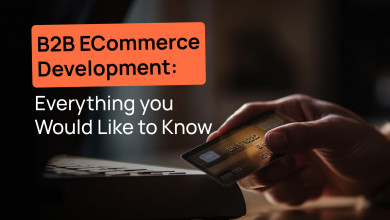Automation is not just desirable but essential for business success if:
- you plan to scale up but don't want to significantly increase the number of staff to handle current tasks.
- your sales team is struggling to process sales lists, leading to lost customers and financial losses.
- the effectiveness of your marketing campaigns has declined, and you're looking for ways to optimize strategies and improve results.
This list could go on indefinitely. To put it simply: if you operate in the B2B segment, you absolutely need process automation.
The market is changing, and so are buying habits. Modern B2B customer expects a personalized approach, simplicity, and transparency, even when it comes to multimillion-dollar purchases of complex equipment. Everyone is tired of long sales cycles and wasted time. Wholesale buyers want to close contracts with the same ease as buying sneakers from their favorite online store.
On the other hand, competitors are putting pressure on you. Unless you're a monopolist, you're constantly forced to find new ways to increase efficiency and reduce costs.
Here's how to build a well-oiled machine that continuously generates leads, helps increase revenue, and accelerates the growth of your business.
What is B2B Sales Automation?
Let's clarify from the outset that B2B automation is a broad concept. It can encompass processes related to marketing, document management, customer service, supply chain management, warehousing, analytics, and other key areas.

In this article, we'll focus only on those aspects that directly impact the improvement of your sales funnel—from lead generation to closing deals.
If you don't find the solution you need, feel free to reach out to our manager. We're confident that we can offer a ready-made solution to address your needs or develop one tailored to your specific requirements. For example, we can help you select and customize B2B marketing automation software.
Benefits of B2B Sales Automation Solutions
Let's not dive too deep; it's probably all quite obvious. But we can't completely overlook this question either. Why Use Automation in Your B2B Sales?
- increased efficiency and sales productivity: The time spent on routine tasks will be significantly reduced.
- fewer errors thanks to automated data entry and system synchronization.
- reduced operational costs, including lower labor expenses.
- improved customer interactions: Enhanced trust and loyalty from your clients.
- the ability to make better decisions based on data.
These are just the basics. Implementing automated systems is an investment in the long-term success of your business.
What’s more interesting is this: logically, after listing the benefits, you'd expect to see the drawbacks. But what downsides could there be in making improvements? Instead, there are challenges that companies face with B2B workflow automation.
Possible challenges
We surveyed several of our clients to understand what they saw as challenges during the automation implementation process.
Client 1: Employee resistance. Many were afraid of losing their jobs, facing more complex responsibilities, and had insufficient understanding of how the new systems work.
Solution: Involve key employees in the selection and implementation process to make them feel valued and included. Conduct training sessions to educate them.
Client 2: Concerns that the implementation process could take a lot of time and lead to temporary productivity losses.
Solution: Develop a detailed plan with a phased approach to minimize the impact on daily operations. Use cloud-based solutions (SaaS), which require lower initial investments. Assess ROI to justify costs and identify long-term benefits.
Client 3: Difficulty integrating with the systems the company is already using. Incompatibility of technologies, data formats, and communication protocols.*
Solution: Utilize tools for data integration between different systems. Develop standardized automation processes that can be adapted for various departments or markets.
In any case, the benefits far outweigh any potential challenges. A cohesive team of professionals will provide support at all levels of the organization and implementation.
Ultimate B2B Sales Automation Guide 2024
The B2B sales cycle can take several weeks or even months and typically involves many participants who influence decision-making.

However, many strategies typical of B2C can also be applied to the business-to-business segment. For example, using chatbots or content marketing strategies. Let's explore practical ways to automate sales process at each stage of the funnel.
Lead Generation
Email marketing, along with call center operations, remains one of the most frequently used tools for B2B sales. It allows you to directly reach your target audience with personalized messages.
However, issues with its effectiveness arise when:
- there isn't a standardized database, and each manager handles "their" clients individually;
- the human factor comes into play: managers forget tasks or fail to complete them on time;
- managers are overwhelmed with routine tasks, manually tracking client interactions, drafting contracts, and sending out commercial proposals.
Solution: integrate a CRM system that automatically creates a client profile upon first contact, assigns tasks to managers, and sets reminders. Customizable CRM systems can reduce up to 80% of routine tasks: the system itself generates and sends contracts, invoices, and proposals. It tracks client interactions, invoices, and revenue, evaluates the performance of each manager, and generates reports.
Additionally, you can add any functionality to the CRM tailored to your business needs:
- Data Parsing from Open Sources: Gather information about companies from platforms like LinkedIn, Crunchbase, and similar sources.
- Automatic Call Scheduling: If a manager fails to reach a client, the system will suggest a date for the next call, automatically dial the client, and connect them with the manager.
- Automated Lead Scoring: Assess leads based on behavior data (e.g., website visits, email opens) and demographic information.
- Segmentation and Filtering: Sort and filter leads by various criteria (industry, job title, company) to simplify further interactions.
At the Lead Generation stage, B2B marketing automation is crucial.
- Useful automation tools for this include marketing platforms: SendPulse, GetResponse, Mailchimp.
- Content Creation and Generation Tools: Jasper (formerly Jarvis), Copy.ai, Writesonic.
- Targeting and Retargeting Automation Tools: Facebook Automated Rules, LinkedIn Campaign Manager, HubSpot Marketing Hub.
Sales Presentation and Negotiation
At this stage, it's crucial to present information effectively and attractively, so the purchasing decision is made as quickly as possible—and in your favor. For example, using a digital demonstration tool that ensures easy content viewing on any device and in offline mode.
Read our case for APTIV company, where we describe how we developed an interactive catalog with an admin panel. This solution allowed for more effective product presentations and increased the number of closed deals.
We also recommend implementing the following automation tools:
- AI and machine learning-based chatbots: these provide real-time answers to potential partners' key questions.
- automated proposal generation software: tools like PandaDoc or DocuSign create proposals based on templates, CRM data, and other sources.
- meeting and call scheduling systems: these should integrate with video conferencing and presentation platforms.
The best solution to bring it all together is an online platform that integrates CRM, ERP (Enterprise Resource Planning) systems, and a client module (at the very least, a personal account with electronic document management, quick access to order history, and crucial information).
Closing the Deal
Automation at this stage focuses on speeding up deal closure and minimizing administrative tasks. The following tools can help:
- financial management and invoicing systems: for example, QuickBooks or Xero. These systems track payments and remind clients of overdue invoices.
- API Integrations with Key Clients: automate data exchange regarding orders, inventory, and delivery. This enables faster deal processing and reduces errors.
- personalization tools: these tools enhance proposals and personal recommendations, increasing the likelihood of successful sales.
For instance, developing a custom tool that automatically updates price lists based on supplier data, currency fluctuations, or other factors. Additionally, the tool can generate personalized discounts based on purchase history from the CRM.
Alternatively, platforms for managing logistics processes, including route planning and inventory management, can be highly beneficial. This is especially useful for companies with large sales volumes and diverse delivery locations. The inclusion of cargo tracking options ensures transparency for your partners and provides you with a significant competitive advantage.
Future Trends in B2B Sales and Marketing Automation
The future of automation in B2B sales promises to minimize human involvement in routine tasks. Intelligent chatbots and machine learning are becoming central to customer service. AI algorithms can already predict the likelihood of closing a deal based on historical data and behavioral patterns. There's a chance that soon, human managers might not even be needed for this process.
Trends are leading us towards hyperautomation. This means that all end-to-end processes—from sales and marketing to logistics and financial management—will be under the control of automated systems.
But these are just forecasts. Given the current market situation, digitalization in wholesale sales is still significantly lagging behind the level of digitalization in retail. Therefore, now is the best time to leap ahead and secure top positions.
Request a free consultation right now and discover which solutions can make your business more efficient and competitive.


